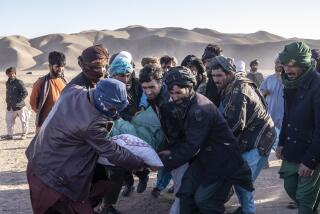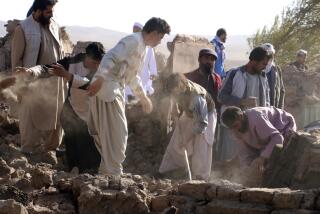Some Pakistanis See Quake as God’s Reprimand
- Share via
GARHI HABIBULLAH, Pakistan — The black wires running through the ruins in this mountain town struck a local Muslim cleric as a message from God.
The wires had delivered cable television to about 300 homes and businesses in the town, which was devastated by the Oct. 8 earthquake.
Imam Shafqat ur-Rehman is convinced that the natural disaster was God’s punishment for people viewing too much cable smut.
“Cable TV is a source of vulgarity and obscenity,” said the imam, who heads a local madrasa, or Islamic school. “There are various programs on cable that a true Muslim just cannot watch.
“I do not know the exact names because I haven’t viewed them myself,” the cleric added. “I have no interest in such things. But my friends tell me they have seen them at roadside hotels and such. They show men and women hugging each other. They also kiss one another. And there are nude pictures.”
For four years, Pakistani President Pervez Musharraf has tried to lead this Muslim majority country of 162 million people away from religious extremism and down a path of what he calls “enlightened moderation.”
His success is crucial to winning the battle of ideas at the heart of the U.S.-declared war on terrorism. The magnitude 7.6 quake dealt a blow to his efforts by giving renewed strength to extremists.
In parts of the quake zone, survivors say Islamic militants, many of them veterans of the rebellion in the Indian-controlled portion of Kashmir, were among the first people to rescue victims trapped in the rubble. It happened in Garhi Habibullah, Rehman said, because Pakistani soldiers didn’t arrive until later.
A bloc of hard-line Islamic parties forms the opposition in the national parliament and governs the seriously damaged North-West Frontier Province, which includes this town. They have argued for years that the president is going too far in tying Pakistan to the West.
After the quake, many people lost all doubt that Musharraf’s approach was wrong.
But, like the rest of Pakistan, Garhi Habibullah is divided over whether the quake, whose death toll stands at nearly 80,000, was an act of divine retribution.
Ihsan Nazeem, 17, doubts that God is against all television.
“TV sets, whether they’re used by poor or rich people, provide information,” said Nazeem, who survived the collapse of a boys’ high school. “It depends how you use it. Some people watch music video channels, some watch news channels. It’s anyone’s choice.”
This remote town, in the mountains about 100 miles north of Islamabad, the capital, first got cable seven months ago. Hundreds of subscribers signed up, despite an anti-cable campaign by the imam and his supporters.
Cable opponents were most upset about the English-language programs beamed in by satellite to the distributor. The imam singled out HBO, which broadcast Hollywood movies and TV shows such as “Sex and the City.” Another popular cable channel here was Rupert Murdoch’s Star TV, which airs “Desperate Housewives” and “The Simple Life 2.”
Mohammed Ikhlaq, 21, whose two sisters and sister-in-law were seriously injured when his house collapsed in the quake, said he and everyone else on his street had cable. He agreed with the imam that they had suffered for their mistake.
“We are Muslims and we are supposed to follow our Islamic teachers, which we had abandoned,” Ikhlaq said.
Rehman, a young man with a gaunt face and a long black beard, sees God’s selective hand in the pattern of the devastation. Houses that had cable connections were flattened, while others weren’t, he claimed.
The imam’s Arabia Islamia madrasa doesn’t have TV sets. Photographing the human form is an insult to God, and therefore not condoned by Islam, he said.
But near the madrasa, the local cable company had run wires past a wall, which collapsed in the quake while the school escaped damage. None of the 150 students were harmed, whereas several hundred students in the town’s government schools were crushed to death.
The imam took that as a divine warning to Musharraf, who has insisted that the country’s tens of thousands of madrasas register with authorities by year’s end so that officials can monitor their curricula and funding.
The government has threatened to close any schools that refuse to comply. A small minority of Pakistan’s madrasas have been linked to terrorist activities, including the July 7 London transit bombings, which killed 52 people and the four bombers.
“President Musharraf should learn a lesson from the earthquake,” Rehman said. “Our religious seminaries remained safe while regular schools and colleges were badly hit.”
Many Pakistanis share Rehman’s view that the cataclysm must be a sign of God’s wrath. Hours after the earthquake, as hundreds of Pakistanis vented their fears on nighttime radio phone-in shows, they repeated rumors that some saw as proof the country had deviated from Islam.
They talked of naked bodies found in the rubble of Islamabad’s upscale Margalla Towers apartment complex, which had partially collapsed in the temblor. Another caller said wine bottles were discovered in the ruins. Alcohol is forbidden by Islam. One claimed men and women’s bodies were found together in the swimming pool.
Tauseeq Haider, a popular radio and TV host, says “a very limited section of the population” holds the view that God punished Pakistan.
But Rehman thinks Pakistan’s drift toward the West, its declining morals and the earthquake are warnings of a looming apocalypse described in the Koran, Islam’s holy book, which Muslims believe was revealed to the prophet Muhammad.
In Garhi Habibullah, the quake inflicted the worst damage on the girls’ high school. The school had 887 students, more than half of whom survived. The bodies of 323 girls were dug up from the ruins, and about 80 corpses are believed to still be buried in the rubble, residents said.
There was nothing wrong with girls being at school, the imam said. But they were not fully covered, offending God, he added.
Standing amid the splintered wood, broken brick and twisted steel rods that once made up the school, Niaz Akhtar scoffed at the imam’s suggestion.
“There wasn’t a single TV set in this school,” he said.
“It was just an unfortunate moment for us. Cable TV is everywhere in Pakistan, but others weren’t hurt. This imam is just giving his own opinion. He’s a liar.”
More to Read
Sign up for Essential California
The most important California stories and recommendations in your inbox every morning.
You may occasionally receive promotional content from the Los Angeles Times.













